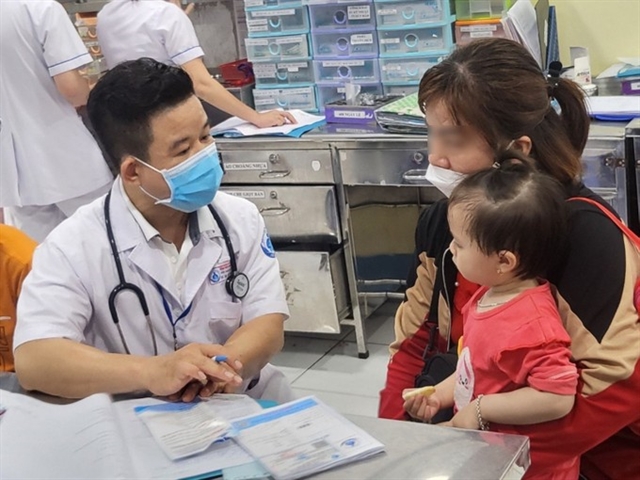.jpg) Society
Society
.jpg)
 |
| A doctor examines a child during a medical check-up in HCM City. — VNA/VNS Photo |
HCM CITY — HCM City has seen a surge in hand-foot-mouth disease (HFMD) cases over the past week with some affected children experiencing severe symptoms.
According to the HCM City Center for Disease Control (HCDC), children’s hospitals across the city have reported an uptick in visits for examinations and treatment in recent days.
Last week alone, there were 916 new cases of HFMD, a surge of 40 per cent compared to the average of the previous four weeks.
Since the start of 2025, over 6,700 cases have been documented in the city, up 49 per cent compared to the same period last year.
Hospitalisations have also risen by 15 per cent, although there have been no reported fatalities.
The districts with the highest number of infections include 1, 5, 7, 12, Bình Chánh, Bình Tân, Tân Bình, and Thủ Đức City.
Dr. Lê Nguyễn Thanh Nhàn, head of the Department of Guidance at Children’s Hospital 1, said that on May 22, the hospital was treating 30 HFMD cases, three of which required mechanical ventilation due to their severe condition.
Dr. Trần Ngọc Lưu, an infectious disease specialist at Children’s Hospital 2, said April often marks the beginning of a spike in HFMD cases.
The disease can occur throughout the year but is most prevalent from March to May and again from September to December, primarily affecting children under the age of five, he added.
HFMD is an acute infectious illness caused by enteroviruses, capable of leading to outbreaks.
Children usually contract the virus through contaminated hands, utensils, and toys, particularly when these items come into contact with faeces or secretions from infected individuals. The disease can also spread through respiratory droplets or saliva during close interactions.
Initial symptoms include fever, mouth ulcers, and rashes that appear as small blisters on the palms, soles, knees, elbows, or buttocks.
Unfortunately, immunity to the disease is not long-lasting, meaning children can become reinfected.
If a child shows signs of infection, it’s crucial to seek medical attention immediately or consult the nearest healthcare facility for guidance, medical experts said.
Without prompt treatment, HFMD can lead to serious complications, including encephalitis, brainstem encephalitis, meningitis, and potential impacts on the cardiovascular and respiratory systems, which could be fatal.
According to Dr. Trương Hữu Khanh, vice chairman of the city’s Infectious Diseases Association, vaccination remains the safest and most effective method to prevent infectious diseases. However, there is currently no vaccine available for HFMD in Việt Nam.
To protect children from the disease, parents are urged to limit their exposure to potential sources of infection, keep sick children home from school, maintain a clean environment, and regularly disinfect toys and surfaces.
Frequent handwashing with soap is essential, especially before meals, after using the bathroom, changing clothes or diapers, and after contact with sick children’s secretions.
In a related move, a vaccine against HFMD caused by the Non-Mouse-Adapted Enterovirus 71 (EV71) strain has been developed in Taiwan (China) and is waiting for approval from the Ministry of Health.
The vaccine was tested by the Pasteur Institute in HCM City on 2,700 children over the past three years with an efficacy of 99.21 per cent with no reported complications or hospitalisations. — VNS
.jpg)



